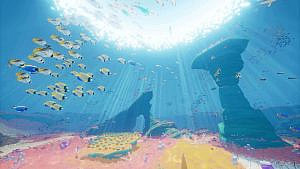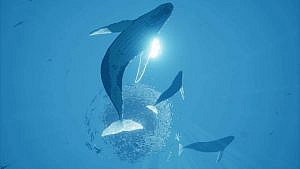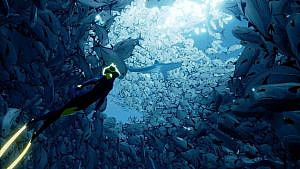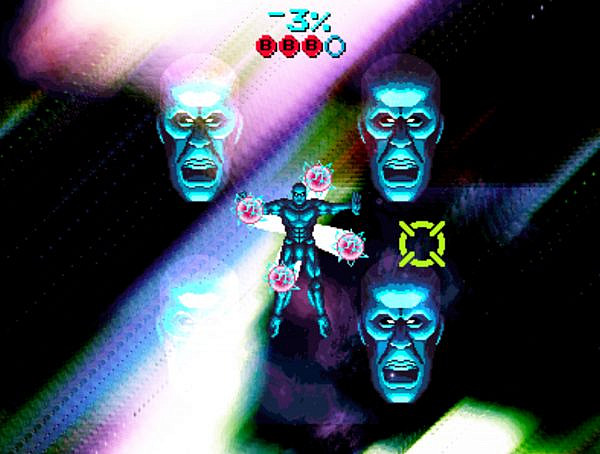Spellbound by Virtual Vastness – The Sublime Rediscovered
The concept of the sublime has been associated with mesmerising phenomena and constructs that leave us breathless, such as massive mountains, imposing architecture, and mathematical infinity. Can a video game evoke an equally powerful response? For more than a decade, critics have expressed their doubts, but Kim took a deep dive in ABZÛ – an underwater adventure game – and found the sublime at the bottom of the virtual ocean.
In the 16th century, Longinus defined the sublime as a sense of awe that master rhetoricians manage to inspire in their audience. More than 200 years later, Edmund Burke wrote an influential treatise in which he delineates core elements of the concept: The sublime is associated with nature but distinct from the beautiful as it evokes terror and overwhelms the human mind and body. Numerous critics have since provided sophisticated definitions of the sublime, but the core elements Burke established have prevailed in popular culture.
Game scholars have argued that due to their interactive and finite nature, video games cannot evoke sublime emotions. Games are manipulated and transformed until the constraints of the system become visible as we achieve mastery. The Burkean sublime is impossible to achieve in a limited system that is subject to manipulation.
Daniel Vella and James O’Sullivan have expressed doubts concerning the line of argument introduced above. Albeit reliant on creating and maintaining an illusion, games are a window into a virtual world that, similar to the natural world, can evoke a powerful emotional or bodily response. Games such as Dark Souls 3 provide an ambiguous narrative, deceptive audiovisuals, and difficult enemies that resist our attempts at manipulation and our endeavour to achieve conceptual clarity.

Fig. 2: A school of yellow fish and pink flora beneath the majestic, sunlit surface of the sea in ABZÛ.
Yaeri Kim dove into ABZÛ to find the Burkean sublime in a game that relies on movement and audiovisuals rather than combat or complex controls for effect. At the bottom of the ocean, she encountered brilliant sea creatures in dark caverns and “blue whales too large to fit the screen” (Kim, 2023). She was “overwhelmed by the diverse beauty and foreboding mystery of the undersea environment” she traversed.
Kim observed that the three-dimensional space she was moving in and the first-person perspective she was forced to adopt encouraged pro-active engagement and facilitated immersion. She concludes that events experienced in three-dimensional space feel more immanent and environments seen from a first-person perspective feel more experiential.
Since there is no map and no free movement in ABZÛ, Kim could neither see nor touch the boundaries of the virtual world. Obscure creatures, strange rocks, and unknown plants obstructed her vision while ambient music suggested that there was more to the underwater world than meets the eye.
She could not escape alienation as there was no time to become familiar with the sublime biomes she swam through. She was but another insignificant organism among many. Overwhelmed by countless complex ecosystems and topographies, she was left to gaze in wonder at that which she could not fully comprehend.
On her journey through the underwater world of ABZÛ, Kim discovered the Burkean sublime. Similar to the architect, the game designer manipulates movement, space, and perspective. However, the developer has more control over the experience and more tools at their disposal, such as ambient music. In ABZÛ, the Burkean sublime is encountered in a new medium, resulting in a familiar yet fresh experience.
Article: Kim, Y. (2023). “Beyond Their Actual Limits”: Immersion, Interactivity, and the Virtual Sublime in Burke and Video Games. Games and Culture, 18(1), 124-141. https://doi.org/10.1177/15554120221084454
Game: ABZÛ
Publisher: 505 Games
Developer: Giant Squid
Platforms: Nintendo Switch, PlayStation 4, Xbox One, Microsoft Windows
Release Date: 02 August, 2016
Genre: Adventure game, Indie game
PEGI: 7
Pictures:
Featured image and Fig. 1-3: Promotional pictures of ABZÛ (Giant Squid 2016), https://505games.com/games/abzu/
Passionate about games, literature, and philosophy, Uriel delights in feeling complex emotions and thinking big thoughts. Overwhelmed by emotions and thoughts, he plays basketball until he turns into metal Mario and needs a nap.
You might also like
More from Game Research Highlights
How do you want to do this? – A look into the therapeutic uses of role-playing games
Can playing RPGs contribute positively to your wellbeing? A recent study aims to find out how RPGs are being used …
Eldritch horrors and tentacles – Defining what “Lovecraftian” is in games
H.P. Lovecrafts legacy lives today in the shared world of Cthulhu Mythos and its iconic monsters. Prema Arasu defines the …
Are Souls Games the Contemporary Myths?
Dom Ford’s Approaching FromSoftware’s Souls Games as Myth reveals the Souls series as a modern mythology where gods fall, desires …















